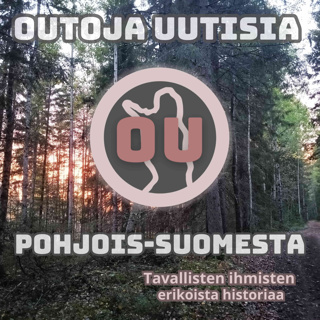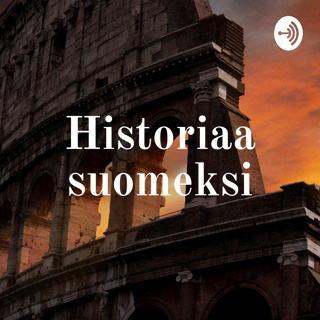
Crime and Punishment
Melvyn Bragg and guests discuss the novel written by Dostoevsky and published in 1866, in which Raskolnikov, a struggling student, justifies his murder of two women, as his future is more valuable than their lives. He thinks himself superior, above the moral laws that apply to others. The police have little evidence against him but trust him to confess, once he cannot bear the mental torture of his crime - a fate he cannot avoid, any more than he can escape from life in St Petersburg and his personal failures.The image above is from a portrait of Dostoevsky by Vasili Perov, 1872.WithSarah Hudspith Associate Professor in Russian at the University of LeedsOliver Ready Lecturer in Russian at the University of Oxford, Research Fellow at St Antony’s College and a translator of this novelAnd Sarah Young Associate Professor in Russian at the School of Slavonic and East European Studies, University College LondonProducer: Simon Tillotson
14 Marras 201952min

The Treaty of Limerick
Melvyn Bragg and guests discuss the 1691 peace treaty that ended the Williamite War in Ireland, between supporters of the deposed King James II and the forces of William III and his allies. It followed the battles at Aughrim and the Boyne and sieges at Limerick, and led to the disbanding of the Jacobite army in Ireland, with troops free to follow James to France for his Irish Brigade. The Catholic landed gentry were guaranteed rights on condition of swearing loyalty to William and Mary yet, while some Protestants thought the terms too lenient, it was said the victors broke those terms before the ink was dry.The image above is from British Battles on Land and Sea, Vol. I, by James Grant, 1880, and is meant to show Irish troops leaving Limerick as part of The Flight of the Wild Geese - a term used for soldiers joining continental European armies from C16th-C18th.With Jane Ohlmeyer Chair of the Irish Research Council and Erasmus Smith’s Professor of Modern History at Trinity College DublinDr Clare Jackson Senior Tutor, Trinity Hall, and Faculty of History, University of Cambridgeand Thomas O'Connor Professor of History at Maynooth UniversityProducer: Simon Tillotson
7 Marras 201952min

Hybrids
Melvyn Bragg and guests discuss what happens when parents from different species have offspring, despite their genetic differences. In some cases, such as the zebra/donkey hybrid in the image above, the offspring are usually infertile but in others the genetic change can lead to new species with evolutionary advantages. Hybrids can occur naturally, yet most arise from human manipulation and Darwin's study of plant and animal domestication informed his ideas on natural selection.With Sandra Knapp Tropical Botanist at the Natural History MuseumNicola Nadeau Lecturer in Evolutionary Biology at the University of SheffieldAndSteve Jones Senior Research Fellow in Genetics at University College LondonProducer: Simon Tillotson
31 Loka 201950min

Robert Burns
Melvyn Bragg and guests discuss the work of the man who, in his lifetime, was called The Caledonian Bard and whose fame and influence was to spread around the world. Burns (1759-1796) was born in Ayrshire and his work as a tenant farmer earned him the label The Ploughman Poet, yet it was the quality of his verse that helped his reputation endure and grow. His work inspired other Romantic poets and his personal story and ideas combined with that, giving his poems a broad strength and appeal - sung by revolutionaries and on Mao's Long March, as well as on New Year's Eve and at Burns Suppers.WithRobert Crawford Professor of Modern Scottish Literature and Bishop Wardlaw Professor of Poetry at the University of St AndrewsFiona Stafford Professor of English at the University of Oxfordand Murray Pittock Bradley Professor of English Literature and Pro Vice Principal at the University of GlasgowProducer: Simon Tillotson
24 Loka 201952min

The Time Machine
Melvyn Bragg and guests discuss the ideas explored in HG Wells' novella, published in 1895, in which the Time Traveller moves forward to 802,701 AD. There he finds humanity has evolved into the Eloi and Morlocks, where the Eloi are small but leisured fruitarians and the Morlocks live below ground, carry out the work and have a different diet. Escaping the Morlocks, he travels millions of years into the future, where the environment no longer supports humanity.The image above is from a painting by Anton Brzezinski of a scene from The Time Machine, with the Time Traveller meeting the EloiWith Simon Schaffer Professor of History of Science at Cambridge UniversityAmanda Rees Historian of science at the University of YorkAndSimon James Professor in the Department of English Studies at Durham UniversityProducer: Simon Tillotson
17 Loka 201951min

Rousseau on Education
Melvyn Bragg and guests discuss the ideas of Jean-Jacques Rousseau (1712-1778) on the education of children, as set out in his novel or treatise Emile, published in 1762. He held that children are born with natural goodness, which he sought to protect as they developed, allowing each to form their own conclusions from experience, avoiding the domineering influence of others. In particular, he was keen to stop infants forming the view that human relations were based on domination and subordination. Rousseau viewed Emile as his most imporant work, and it became very influential. It was also banned and burned, and Rousseau was attacked for not following these principles with his own children, who he abandoned, and for proposing a subordinate role for women in this scheme.The image above is of Emile playing with a mask on his mother's lap, from a Milanese edition published in 1805.With Richard Whatmore Professor of Modern History at the University of St Andrews and Co-Director of the St Andrews Institute of Intellectual HistoryCaroline Warman Professor of French Literature and Thought at Jesus College, Oxfordand Denis McManus Professor of Philosophy at the University of SouthamptonProducer: Simon Tillotson
10 Loka 201951min

Dorothy Hodgkin
Melvyn Bragg and guests discuss the work and ideas of Dorothy Crowfoot Hodgkin (1910-1994), awarded the Nobel Prize in Chemistry in 1964 for revealing the structures of vitamin B12 and penicillin and who later determined the structure of insulin. She was one of the pioneers of X-ray crystallography and described by a colleague as 'a crystallographers' crystallographer'. She remains the only British woman to have won a Nobel in science, yet rejected the idea that she was a role model for other women, or that her career was held back because she was a woman. She was also the first woman since Florence Nightingale to receive the Order of Merit, and was given the Lenin Peace Prize in recognition of her efforts to bring together scientists from the East and West in pursuit of nuclear disarmament.With Georgina Ferry Science writer and biographer of Dorothy HodgkinJudith Howard Professor of Chemistry at Durham UniversityandPatricia Fara Fellow of Clare College, CambridgeProducer: Simon Tillotson
3 Loka 201952min

The Rapture
Melvyn Bragg and guests discuss the ideas developed by the Anglican priest John Nelson Darby (1800-1882), drawn from his reading of scripture, in which Jesus would suddenly take His believers up into the air, and those left behind would suffer on Earth until He returned with His church to rule for a thousand years before Final Judgement. Some believers would look for signs that civilization was declining, such as wars and natural disasters, or for new Roman Empires that would harbour the Antichrist, and from these predict the time of the Rapture. Darby helped establish the Plymouth Brethren, and later his ideas were picked up in the Scofield Reference Bible (1909) and soon became influential, particularly in the USA. With Elizabeth Phillips Research Fellow at the Margaret Beaufort Institute at the University of Cambridge and Honorary Fellow in the Department of Theology and Religion at Durham UniversityCrawford Gribben Professor of Early Modern British History at Queen’s University Belfastand Nicholas Guyatt Reader in North American History at the University of CambridgeProducer: Simon Tillotson
26 Syys 201951min






















